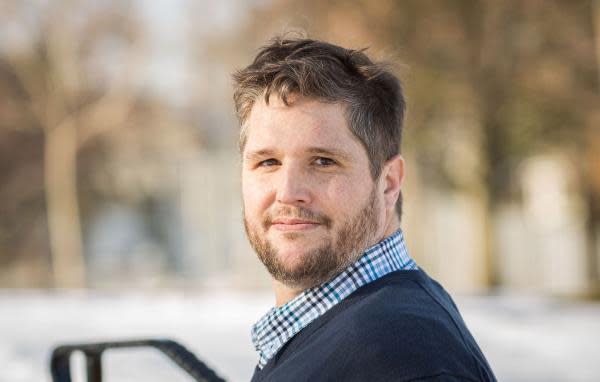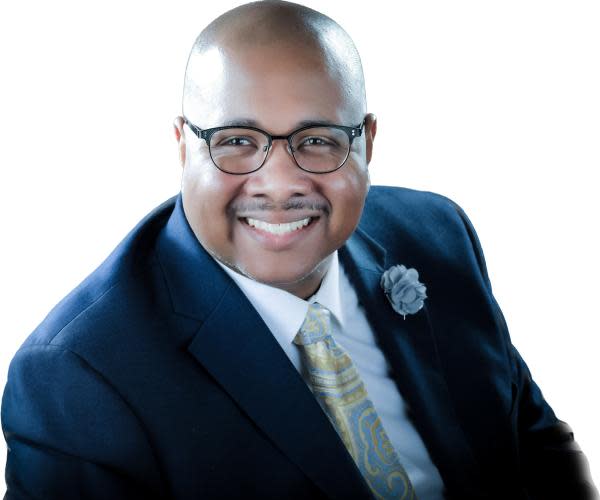Primary opponents in South Bend Council Dist. 1 talk crime, economic development, poverty
The Tribune is partnering with the League of Women Voters of the South Bend Area and the American Democracy Project of Indiana University South Bend to publish candidates' answers to questions on the issues. The League, with local help from the ADP, operates Vote411.org, a website with information about the candidates and their positions on key issues.
The Tribune has agreed to run candidate answers unedited, meaning any spelling, typographical or grammatical errors are the candidates' own. The Tribune is publishing only some of the questions from a selection of contested races. Additional questions and answers, including from candidates who have no opponent in the primary, are available at Vote411.org.
Early voting for Indiana's May 2 municipal primary election began last week. To vote early, either fill out an application for a mail ballot at https://indianavoters.in.gov/MVPHome/PrintDocuments or vote in person. In St. Joseph County, there are two early-voting locations: the County-City Building, 227 W. Jefferson Blvd. in South Bend; or the Mishawaka County Services Building, 219 Lincoln Way W. in Mishawaka. Voters must present a valid government-issued photo ID.
Early-voting hours at both locations are 8 a.m. to 4:30 p.m. Mondays through Fridays (except May 1, when voting closes at noon.); 8 a.m. to 4 p.m. on Saturdays April 22 and 29; 1 to 4 p.m. Sunday, April 30.
In South Bend's Common Council First District, incumbent Canneth Lee faces a challenge from Nick Hamann in the Democratic primary. There currently is no Republican candidate for the office.
Nick Hamann

Occupation: Safety compliance consultant
Email: nicholas.j.hamann@gmail.com
Campaign phone: 773-895-7962
Facebook: facebook.com/profile.php?id=5609718
Canneth Lee

Occupation: Community outreach coordinator for Goodwill Industries
Email: cannethl@yahoo.com
Website: cannethlee.com
Campaign phone: 317-748-3414
Several recent local examples show the importance of communication among elected officials. Issues surrounding a civilian board to review police behavior and attempts to fund a mental health crisis center illustrate this point. How will you ensure effective communication with other elected officials, as well as transparency with the public?
Hamann: We have witnessed over the last few years how miscommunication and lack of transparency among elected leaders has dampened the amount of progress we have been able to make on critical issues. What has resulted is a feeling of mistrust both between these elected officials and from a public that feels let down. The damage extends beyond the failure to deliver on these specific issues. It undermines the trust that our residents have in our system as a whole. I have been struck by how often my conversations with voters alternate between their genuine aspiration for a better future and increasing skepticism that their participation has any bearing on it. We need to be deliberate about turning this around. The solution is not very complicated or novel: it takes effort, consistency, and good faith.
Lee: I think we have to be able to have honest dialogue without it becoming a personal attack. The issues we address are important to the residents and the public should be able to know what’s going on. Many times these issue were sensationalized only to create drama for the media and that doesn’t serve our citizen well. One of the things that I am proud of is that when we saw things with were not going in the right direction we did come together unanimously and voted for a change.
What is the best way to curb crime? Should we increase police staffing, technology and budgets? Or should we redirect resources away from policing? Explain your reasoning.
Hamann: First, we should acknowledge that long-term safety will follow from investment in people and neighborhoods. Unless we address the increasing economic and social inequalities in our city, we will be stuck spinning our wheels. We must make sure that there are enough resources and opportunities in all corners of the city. That being said, it is imperative we bring everything we have to bear to address the increase in crime over the last couple of years. The city recently stated that the police department is back to being fully staffed which should make it easier for the officers to respond to calls more effectively. We should work to increase engagement and trust between our officers and the residents of the neighborhoods.
Lee: As a person who has served the community on the frontlines of group violence intervention, we have to see violence as a disease and treat it. Many people who are involved in violence have been infected by it because of their environment and keep spreading it to other people. The cure to violent behavior starts at the home. Children aren’t born violent they learn it. When Police Dept. are understaffed things get neglected. We don’t need to defund the police, we need to incorporate ways to deploy resources. Strategies like Group Violence Intervention are effective. It takes the Community, Law Enforcement, Politicians and Social services working together to treat this problem. People without hope can be dangerous, we have to give people hope for a better life and access to opportunities. Less than 1% of population is causing the violence.
The South Bend Redevelopment Commission is responsible for much of the public money going toward private investment. What should be required of companies seeking financial incentives and investments and what power should the city have to reclaim tax money if a company does not fulfill its promises?
Hamann: When public money is being directed towards private investments, the analysis needs to go beyond elusive projections about job creation and tax revenue. Private companies that seek out public incentives and investment must be able to articulate a vision for how a proposed project would be beneficial to the local area where it will take place as well as to the City as a whole. Job creation and tax revenue are certainly relevant factors here, but these companies need to demonstrate to the Commission that these projects are consistent with the needs and characteristics of the City. Just as important, the City and the Commission have the obligation to ensure that recipients of public funds are fully accountable to the terms of the deal. That starts with drafting clear and objectively measurable benchmarks.
Lee: I think there should be an agreement that requires companies to reinvest in the communities they are apart of. There already exist provisions in the tax abatement that states if the company doesn’t meet the requirement they have to pay the money back. Tax abatements are not free money it’s an investment.
Many recognize a disparity in economic growth in different parts of the city. What steps will you take to ensure economic growth and development is more widely distributed across the entire community?
Hamann: The residents of the First District certainly recognize the disparity in economic growth among different parts of the city. I hear this a lot from them. Part of this story is good: the improvements to the downtown and the east side of town have been significant over the last decade. But that leaves residents in other parts of town wondering when it’s their turn to see growth. We need to ensure our growth throughout the city is equitable.
Lee: We are seeing it now, there are great projects going on all over South Bend. As a Council member yes you represent your district but you also have a voice in what’s going on in other parts of the city. I think South Bend can do well in manufacturing and being a hub for distribution centers, since we have a railroad system and we are strategically located in the middle of America
What can the city do to address the issues of children and adults living in poverty and/or homelessness in the community?
Hamann: In terms of families living in homelessness, the city has found a possible solution as of late. It begins with housing first for those who have been living in tents and sleeping in doorways. Being able to find a semblance of stability in a low barrier intake facility such as Motels For Now allows them to access critical physical and emotional care that they would not receive on the streets. Once stabilized, they can work access help for any addictions they have and get assistance acquiring the paperwork they need to move forward. Hopefully, by 2025, our community will have a more permanent low barrier intake facility and move on from M4N. That said, M4N has enabled hundreds of otherwise chronically homeless individuals to access permanent housing. It is not perfect, but is successful. I also want to commend the Mayor for stepping up.
Lee: We have to find away to fund affordable housing and investment in programs and organizations that address those needs. We must create a strong partnership with the South Bend Housing Authority and developers to create more permanent supportive housing. We need to help our seniors get the necessary assistance for home repair so they can stay in their homes. We have to enhance programs for people to become home owners by fixing up houses that might be challenged. We have to make available the mental health services that are critical for those in need of services. There are programs available where residents can get free resume services, job searching help and career path planning.
This article originally appeared on South Bend Tribune: South Bend Dist. 1 hopefuls talk crime, economic development, poverty
